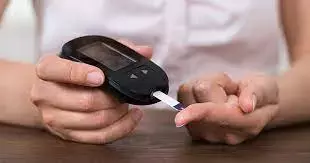- Home
- Medical news & Guidelines
- Anesthesiology
- Cardiology and CTVS
- Critical Care
- Dentistry
- Dermatology
- Diabetes and Endocrinology
- ENT
- Gastroenterology
- Medicine
- Nephrology
- Neurology
- Obstretics-Gynaecology
- Oncology
- Ophthalmology
- Orthopaedics
- Pediatrics-Neonatology
- Psychiatry
- Pulmonology
- Radiology
- Surgery
- Urology
- Laboratory Medicine
- Diet
- Nursing
- Paramedical
- Physiotherapy
- Health news
- Fact Check
- Bone Health Fact Check
- Brain Health Fact Check
- Cancer Related Fact Check
- Child Care Fact Check
- Dental and oral health fact check
- Diabetes and metabolic health fact check
- Diet and Nutrition Fact Check
- Eye and ENT Care Fact Check
- Fitness fact check
- Gut health fact check
- Heart health fact check
- Kidney health fact check
- Medical education fact check
- Men's health fact check
- Respiratory fact check
- Skin and hair care fact check
- Vaccine and Immunization fact check
- Women's health fact check
- AYUSH
- State News
- Andaman and Nicobar Islands
- Andhra Pradesh
- Arunachal Pradesh
- Assam
- Bihar
- Chandigarh
- Chattisgarh
- Dadra and Nagar Haveli
- Daman and Diu
- Delhi
- Goa
- Gujarat
- Haryana
- Himachal Pradesh
- Jammu & Kashmir
- Jharkhand
- Karnataka
- Kerala
- Ladakh
- Lakshadweep
- Madhya Pradesh
- Maharashtra
- Manipur
- Meghalaya
- Mizoram
- Nagaland
- Odisha
- Puducherry
- Punjab
- Rajasthan
- Sikkim
- Tamil Nadu
- Telangana
- Tripura
- Uttar Pradesh
- Uttrakhand
- West Bengal
- Medical Education
- Industry
Tirzepatide tied with Significant Reduction in Liver Fat Content in Patients with T2D: Study

Tirzepatide Shows a Significant Reduction in Liver Fat Content in Patients with T2D, according to a recent study published in The Lancet Diabetes and Endocrinology.
Tirzepatide is a novel dual glucose-dependent insulinotropic polypeptide (GIP) and glucagon-like peptide-1 receptor agonist under development for the treatment of type 2 diabetes. The aim of this substudy was to characterise the changes in liver fat content (LFC), the volume of visceral adipose tissue (VAT), and abdominal subcutaneous adipose tissue (ASAT) in response to tirzepatide or insulin degludec in a subpopulation of the SURPASS-3 study. This substudy of the randomised, open-label, parallel-group, phase 3 SURPASS-3 trial was done at 45 medical research centres and hospitals across eight countries (Argentina, Austria, Greece, Hungary, Italy, Romania, Spain, and the USA). Eligible participants were adults with type 2 diabetes, a baseline HbA1c 7·0–10·5% (53–91 mmol/mol), a BMI of at least 25 kg/m2, stable weight, were insulin-naive, and on treatment with metformin alone or in combination with a SGLT2 inhibitor for at least 3 months before screening. In addition to the main study inclusion criteria, substudy participants had a fatty liver index of at least 60. Participants had an MRI scan and were randomised (1:1:1:1) in the main study to subcutaneous injection once per week of tirzepatide 5 mg, 10 mg, or 15 mg, or subcutaneous injection once per day of titrated insulin degludec, using an interactive web-response system, and were stratified by country, HbA1c, and concomitant oral anti-hyperglycaemic medication. The primary efficacy endpoint was the change from baseline in LFC (as measured by MRI-proton density fat fraction [MRI-PDFF]) at week 52 using pooled data from the tirzepatide 10 mg and 15 mg groups versus insulin degludec. Analyses were assessed in the enrolled MRI population, which consisted of participants in the modified intention-to-treat population of the main study who also had a valid MRI at either baseline or after baseline. This is a substudy of the trial registered with ClinicalTrials.gov, number NCT03882970, and is complete.
The findings of the study are:
- From April 1, 2019, to Nov 15, 2019, 502 participants were assessed for eligibility to participate in this substudy, 296 (59%) of whom were included in the enrolled MRI population and randomly assigned to treatment.
- Baseline demographics and clinical characteristics were similar across all treatment groups.
- From an overall mean baseline LFC of 15·71%, the absolute reduction in LFC at week 52 was significantly greater for the pooled tirzepatide 10 mg and 15 mg groups versus the insulin degludec group
- The estimated treatment difference versus insulin degludec was –4·71%
- The reduction in LFC was significantly correlated (p≤0·0006) with baseline LFC (ρ=–0·71), reductions in VAT (ρ=0·29), reductions in ASAT (ρ=0·33), and reductions in body weight (ρ=0·34) in the tirzepatide groups.
Thus, Tirzepatide showed a significant reduction in LFC and VAT and ASAT volumes compared with insulin degludec in this subpopulation of patients with type 2 diabetes in the SURPASS-3 study. These data provide additional evidence on the metabolic effects of this novel dual GIP and GLP-1 receptor agonist.
Reference:
Effect of tirzepatide versus insulin degludec on liver fat content and abdominal adipose tissue in people with type 2 diabetes (SURPASS-3 MRI): a substudy of the randomised, open-label, parallel-group, phase 3 SURPASS-3 trial by Amalia Gastaldelli, et al. published in The Lancet Diabetes and Endocrinology.
DOI: https://doi.org/10.1016/S2213-8587(22)00070-5
Keywords:
Tirzepatide, Reduction, Liver, Fat, Content, Patients, type 2 diabetes, The Lancet Diabetes and Endocrinology, Prof Amalia Gastaldelli, Kenneth Cusi, Laura Fernández Landó, Ross Bray, Bram Brouwers, Ángel Rodríguez
Dr. Shravani Dali has completed her BDS from Pravara institute of medical sciences, loni. Following which she extensively worked in the healthcare sector for 2+ years. She has been actively involved in writing blogs in field of health and wellness. Currently she is pursuing her Masters of public health-health administration from Tata institute of social sciences. She can be contacted at editorial@medicaldialogues.in.
Dr Kamal Kant Kohli-MBBS, DTCD- a chest specialist with more than 30 years of practice and a flair for writing clinical articles, Dr Kamal Kant Kohli joined Medical Dialogues as a Chief Editor of Medical News. Besides writing articles, as an editor, he proofreads and verifies all the medical content published on Medical Dialogues including those coming from journals, studies,medical conferences,guidelines etc. Email: drkohli@medicaldialogues.in. Contact no. 011-43720751


